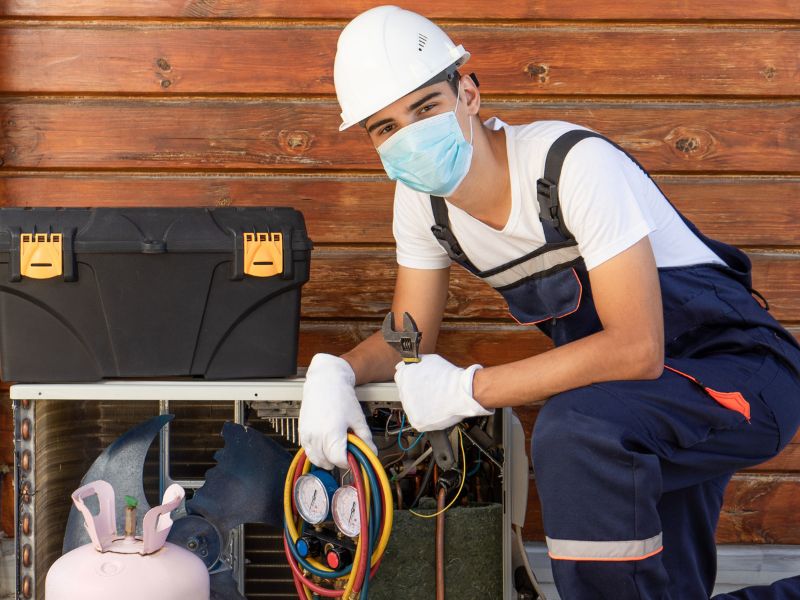Summer is here, and as temperatures rise, so does our dependence on air conditioning systems. While we rely on these units to keep us cool, it’s essential to be aware of the signs of a freon leak. Freon is the coolant gas utilized in air conditioners, and if it leaks, it can pose a significant risk to your health and the environment. Moreover, if the freon level continues to drop below a certain point, it could potentially damage your air conditioning system, leading to costly repairs. To ensure your safety and keep your HVAC system running smoothly, we have put together a guide to help you identify the signs of a freon leak.
Tabe of Contents
- 1. Understanding the Basics of Freon and its Importance in HVAC Systems
- 2. The Impact of Freon on Human Health and the Environment
- 3. Experiencing Common Symptoms of a Freon Leak in Your Home or Office
- 4. Identifying Visible Signs of a Possible Freon Leak and When to Contact a Professional
- 5. Preventing Freon Leak and How to Maintain Your HVAC System to Avoid Future Leaks
- People Also Ask:
- Conclusion:
1. Understanding the Basics of Freon and its Importance in HVAC Systems
Freon is a type of refrigerant that plays a crucial role in HVAC (Heating, Ventilation, and Air Conditioning) systems. The refrigerant takes on heat through the evaporator coil, cools the surrounding air, and then releases the heat to the outside through the condenser coil. This cycle is then repeated to provide conditioned air to the living or working space.
In older HVAC systems, R-22 (a type of Freon) was commonly used as a refrigerant, but due to its harmful effects on the environment, the Environmental Protection Agency (EPA) mandated that the refrigerant be phased out. As a result, many HVAC systems now use R-410A, a blend that doesn’t harm the environment and is just as efficient as R-22.
It’s essential to keep the appropriate levels of Freon in your HVAC system. Low refrigerant levels can cause your system to work harder, leading to more wear and tear on the components. It can also cause your system to freeze up, impacting its ability to generate conditioned air. Therefore, it’s crucial to receive regular maintenance on your HVAC system, so technicians can check and maintain the correct levels of refrigerant.
2. The Impact of Freon on Human Health and the Environment
Freon, also known as chlorofluorocarbon (CFC) or hydrochlorofluorocarbon (HCFC), is a chemical compound commonly used in HVAC systems as a refrigerant. While Freon is an essential component that enables HVAC systems to cool air efficiently, it can pose significant risks to human health and the environment if it is not handled correctly.
Health Risks
When Freon leaks into the air, it can lead to various health problems, particularly for those with pre-existing respiratory conditions. Inhaling Freon can cause dizziness, nausea, headaches, and even suffocation in extreme cases. In addition, Freon can displace oxygen, leading to asphyxiation, which can be fatal. Freon exposure can also cause skin and eye irritation, and prolonged exposure can lead to long-term damage to the central nervous system.
Environmental Impact
Freon leaks can cause significant environmental damage, primarily when released into the atmosphere. These chemicals can break down the ozone layer, leading to an increase in the levels of UV radiation reaching the earth’s surface. This can have severe implications for human health, including an increased risk of skin cancer and cataracts. Furthermore, Freon contributes to climate change by trapping heat in the earth’s atmosphere and adding to the greenhouse effect.
As such, it is crucial to handle Freon with care and to seek professional help immediately should you suspect a Freon leak. By doing so, you can protect your health, safeguard the environment, and ensure your HVAC system runs efficiently for years to come.
3. Experiencing Common Symptoms of a Freon Leak in Your Home or Office
A freon leak in your HVAC system can pose serious risks to your health and the environment, therefore, it is crucial to be aware of the common symptoms of a freon leak in your home or office. Here are some of the signs that you may be experiencing a freon leak:
1. Unusual noises coming from your HVAC system: One of the first indications of a possible freon leak is unusual noises coming from your HVAC system. This could be a humming sound or a hissing sound that is not typical of your HVAC system. If you notice any of these sounds, it’s crucial to contact a professional for an inspection.
2. Experiencing frequent headaches or fatigue: Inhaling freon can cause health problems such as headaches, dizziness, fatigue, and nausea. If you experience any of these symptoms while in your home or office, it is essential to contact a professional HVAC technician to check for a freon leak.
3. Your air conditioning is not cooling the room: If you notice that your air conditioner is not producing cool air as it used to, it could be an indication of a freon leak. This is because a low level of refrigerant or freon could be causing the system to underperform.
If you experience any of the above symptoms, it is essential to contact a professional HVAC technician immediately. Ignoring a freon leak can be dangerous to your health and can cause severe damage to your HVAC system.
4. Identifying Visible Signs of a Possible Freon Leak and When to Contact a Professional
When your HVAC system is running smoothly, it’s easy to forget about it altogether. However, ignoring the signs of potential issues can lead to significant damages and costly repairs. One of the most crucial issues for an HVAC system is a possible Freon leak that can cause a range of problems, from decreased cooling efficiency to potentially harmful air pollutants.
Identifying Visible Signs of a Freon Leak
Before understanding the visible signs of a Freon leak, it’s essential to know what Freon is and how it operates in the HVAC system. Freon is a gas that acts as a refrigerant, absorbing the heat from the air in your home and then releasing it outside. If there is a leak in the Freon system, the loss of gas can cause a range of problems in your HVAC system.
One of the most visible signs of the presence of a Freon leak is frost on the coils of your air conditioning units. This indicates a loss of refrigerant pressure and diminished cooling due to the drop in temperature. You may also notice unusual noises coming from your HVAC system, such as hissing or bubbling sounds, which could signify Freon leaking and circulating through different parts of the system. A strange smell, particularly one that smells like nail polish, can also signal a Freon leak.
When to Contact a Professional
It’s crucial to contact an HVAC professional as soon as you suspect a Freon leak in your system. A professional can conduct a more thorough inspection of your HVAC unit and assess the extent of the leak. Since Freon is a potentially harmful substance, it poses a significant health risk to anyone exposed to it. A licensed professional is qualified and trained to handle the gas safely and can fix the issue before the leak becomes more extensive.
Attempting to fix a Freon leak yourself can be dangerous and can cause expensive damages if done incorrectly. It’s easy to let minor issues turn into significant problems, but a quick call to a professional can save you time, money, and headaches in the long run.
5. Preventing Freon Leak and How to Maintain Your HVAC System to Avoid Future Leaks
Preventing a Freon leak is important to ensure the safety of both your home or office and the environment. Here are some tips on how to maintain your HVAC system and avoid future leaks:
1. Schedule Regular Maintenance
A professional technician should service your HVAC system once a year to ensure that it is running efficiently and identify any potential leaks. During this maintenance check, the technician will clean the coils, clean the drain lines, and check for refrigerant leaks.
2. Change Your Air Filter Regularly
A dirty air filter can cause your HVAC system to overheat, which can lead to a Freon leak. Regularly changing your air filter can prevent damage to your system and save you money on your energy bills.
3. Keep Your Coils Clean
Dirty coils can also cause your system to overheat and put pressure on the refrigerant lines. Regularly cleaning your coils can help prevent leaks and keep your system running efficiently.
4. Install a Leak Detection System
If you have an older HVAC system or are worried about potential leaks, consider installing a leak detection system. These systems use sensors to detect Freon leaks and can alert you or your HVAC technician when a leak is detected.
5. Use a Professional HVAC Technician
If you suspect a Freon leak, do not try to repair it yourself. Freon is dangerous and should only be handled by a professional technician who is trained in HVAC repair and maintenance.
By following these simple steps, you can help prevent Freon leaks and keep your HVAC system running efficiently. Regular maintenance and cleaning can save you money on energy bills and prevent costly repairs in the future.
People Also Ask:
How do I know if my AC is leaking Freon?
One of the most common signs of a Freon leak in an air conditioning system is reduced cooling performance. Other signs include hissing or bubbling noises, ice buildup on the evaporator coil, and an oily residue around the AC unit.
Is a Freon leak dangerous?
Freon is a type of refrigerant that can be harmful if inhaled. Symptoms of Freon inhalation include dizziness, headaches, and respiratory distress. In addition, Freon leaks can also damage the environment by depleting the ozone layer.
Can I fix a Freon leak myself?
It is generally not recommended to attempt to fix a Freon leak yourself. Handling and repairing refrigerant requires special training and equipment, and attempting to do it without proper training can be dangerous.
How much does it cost to fix a Freon leak?
The cost to fix a Freon leak will depend on the location and severity of the leak, as well as the type of system and refrigerant being used. In general, the cost of repairs can range from a few hundred dollars to over a thousand dollars.
What happens if you run your AC with a Freon leak?
Running an air conditioning system with a Freon leak can cause damage to the compressor and other components of the system. In addition, it can also lead to reduced cooling performance and higher energy bills.
Conclusion:
If you suspect that your air conditioning system is leaking Freon, it is important to have it inspected by a qualified HVAC technician. Freon leaks can not only be harmful to your health, but can also damage the environment and cause damage to your AC system. Contact a professional to have your system inspected and repaired as soon as possible.

Senior AC Consultant
Jackson’s wealth of knowledge in air conditioning units assists clients in selecting the most suitable systems. His guidance ensures optimal cooling solutions tailored to specific needs.

